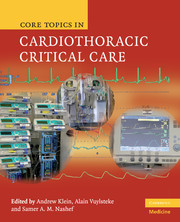Book contents
- Frontmatter
- Contents
- Contributors
- Preface
- Foreword
- Abbreviations
- SECTION 1 Admission to Critical Care
- SECTION 2 General Considerations in Cardiothoracic Critical Care
- 8 Managing the airway
- 9 Tracheostomy
- 10 Venous access
- 11 Invasive haemodynamic monitoring
- 12 Pulmonary artery catheter
- 13 Minimally invasive methods of cardiac output and haemodynamic monitoring
- 14 Echocardiography and ultrasound
- 15 Central nervous system monitoring
- 16 Point of care testing
- 17 Importance of pharmacokinetics
- 18 Radiology
- SECTION 3 System Management in Cardiothoracic Critical Care
- SECTION 4 Procedure-Specific Care in Cardiothoracic Critical Care
- SECTION 5 Discharge and Follow-up From Cardiothoracic Critical Care
- SECTION 6 Structure and Organisation in Cardiothoracic Critical Care
- SECTION 7 Ethics, Legal Issues and Research in Cardiothoracic Critical Care
- Appendix Works Cited
- Index
17 - Importance of pharmacokinetics
from SECTION 2 - General Considerations in Cardiothoracic Critical Care
Published online by Cambridge University Press: 05 July 2014
- Frontmatter
- Contents
- Contributors
- Preface
- Foreword
- Abbreviations
- SECTION 1 Admission to Critical Care
- SECTION 2 General Considerations in Cardiothoracic Critical Care
- 8 Managing the airway
- 9 Tracheostomy
- 10 Venous access
- 11 Invasive haemodynamic monitoring
- 12 Pulmonary artery catheter
- 13 Minimally invasive methods of cardiac output and haemodynamic monitoring
- 14 Echocardiography and ultrasound
- 15 Central nervous system monitoring
- 16 Point of care testing
- 17 Importance of pharmacokinetics
- 18 Radiology
- SECTION 3 System Management in Cardiothoracic Critical Care
- SECTION 4 Procedure-Specific Care in Cardiothoracic Critical Care
- SECTION 5 Discharge and Follow-up From Cardiothoracic Critical Care
- SECTION 6 Structure and Organisation in Cardiothoracic Critical Care
- SECTION 7 Ethics, Legal Issues and Research in Cardiothoracic Critical Care
- Appendix Works Cited
- Index
Summary
Introduction
Pharmacokinetics can be defined as the study of drug and drug metabolite concentrations within the body. It describes how drug concentrations may vary over time owing to the different phases after drug administration, namely absorption, distribution, metabolism and elimination. Knowledge of changes in critical illness and after major surgery may allow prediction of the correct dose and regime to ensure therapeutically effective levels at the site of action. In critical care, the pathophysiological changes over the course of the illness may significantly alter the pharmacokinetic behaviour of drugs. Therefore, changes may need to be made at different times to prevent over- or underdosing.
Pathophysiology
To understand the correct principles of drug administration in critical illness, it is necessary to identify which pathophysiological changes at what point during critical illness.
Gastrointestinal absorption
Drug absorption in the gastrointestinal tract after oral administration is a kinetic process, which may be reduced by an unpredictable amount in the early postoperative period after major surgery. It is reduced due to gastric stasis, metabolic imbalance or reduced splanchnic blood flow associated with hypotension and use of inotropic agents. Therefore, the intravenous route may be preferable until enteral/oral feeding is established, to ensure therapeutic levels are achieved.
- Type
- Chapter
- Information
- Core Topics in Cardiothoracic Critical Care , pp. 123 - 126Publisher: Cambridge University PressPrint publication year: 2008



